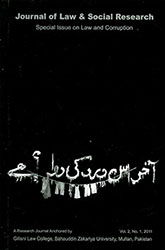Corruption in Pakistani Courts in the Light of Local Cultural Context: The Case Study of the Pakistani Punjab
DOI:
https://doi.org/10.7146/nnjlsr.v0i2.111120Abstract
No abstract
References
Chaudhary, M. Azam (2006) The place of Customary law in Pakistani Legal Culture. In: Journal of Asian Civilizations, vol. XXIX, no. 2, 114-141, 2006.
Chaudhary, M. Azam (1999) Justice in Practice: Legal ethnography of a Pakistani Punjabi Village. Karachi: Oxford University Press.
Cohn, Bernard C. (1989) Law and the Colonial State in India. In: History and Power in the Study of Law: New directions in Legal Anthropology. June Starr and
Jane F. Collier (Eds.). New York: Cornell University.
Cohn, Bernard C. (1967) Some Notes on Law and Change in North India. In: Law and Warfare: Studies in the Anthropology of Conflict. Paul Bohannan (Ed.). New
York: Natural History Press.
Constitution of Pakistan. (1990) Constitution of Pakistan. Islamabad: Federal Shariat Academy.
Eglar, Zekiye (1960) A Punjabi Village in Pakistan. New York: Columbia University Press.
Geertz, Clifford (1973) The Interpretation of Cultures. New York: Basic Books.
Geertz, Clifford (1983) Local Knowledge: Facts and Law in Comparative Perspective. In: Local Knowledge: Further Essays in Interpretative Anthropology. New York: Basic Books.
Haq, Huma (2000). Feminist Islam and Sexist Muslims: A case study of Rural Punjab. In: Pakistan Journal of Social Sciences Vol. XXIII, 1997.
Helmken, Dierk (1976) Der Gleichheitssatz in der Praxis des Indischen Zivilverfahren. Wiesbaden: Steiner.
Hoebel, E. Adamson (1965) Fundamental Cultural Postulates and Judicial Lawmaking in Pakistan. In: American Anthropologist, Special Publication 67.6,
1965.
Law Reform Commission. (1959). The report of the Law Reform Commission 1958-59. Karachi: Government of Pakistan Ministry of Law.
- 1970. The report of the Law Reform Commission 1967-70. Karachi: Government of Pakistan Ministry of Law and Parliamentary Affairs (Law Division) Karachi.
Lyon, S. M. (2004). An Anthropological Analysis of Local Politics and Patronage in a Pakistan Punjabi village. Lapeter: Edwin Mellen Press.
Moon, Penderel (1930) Strangers in India. London: Faber and Faber.
Moore, Erin (1993) Gender, Power, and Legal Pluralism: Rajastan, India. In: American Anthropologist, 20.3, 1993.
Moore, Erin (1985) Conflict and Compromise: Justice in an Indian Village. New York: University Press of America.
Rosen, Lawrence (1989) Islamic “Case Law” and the Logic of Consequence. In: History and Power in the Study of Law: New directions in Legal Anthropology. June
Starr and Jane F. Collier (Eds.). New York: Cornell University.
Downloads
Published
How to Cite
Issue
Section
License
Counting from number 12 (2022), articles published in NNJLSR are licensed under Attribution 4.0 International (CC BY 4.0). Readers are allowed to copy and redistribute the articles in any medium or format, to adapt and revise the articles, and use the articles for commercial purposes, provided that the readers give appropriate credits.
No Creative Commons licenses are applied on articles in number 1 (2009)-11 (2021). All rights reserved by the authors. Readers are allowed to download, read, and link to the articles published in volume 1 (2009)-11 (2021), but they may not republish or redistribute these articles without permission of the authors.

